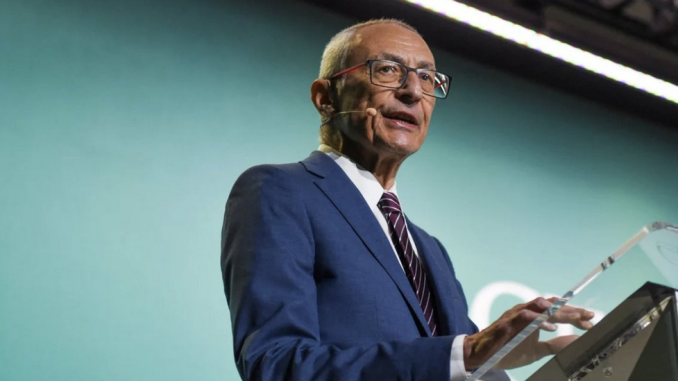Dan Linnaeus tweeted the following:

EXCLUSIVE | The Podesta Brothers & Russian Influence – The Washington Outsider Center
This just-released bombshell report by the Washington Outsider Center is the culmination of months of research built upon the investigations of the OCCRP, BIRD, Forbes, The Financial Times, the Bulgarian and Turkish governments and many others over the span of multiple years…
Summary
The Biden-Harris administration, with the help of Doug Emhoff’ s firm Venable, is financing Kremlin-linked projects in Africa and Europe. Harris/Emhoff hid the fact that Emhoff continued to get paid by Venable and he continued to hold an interest and significant shares in Venable as it lobbied for the sanctioned Russian Sberbank. Emhoff’s firm only disclosed $200 after picking-up the Sberbank case, but a 2019 tax return Schedule E reveals $115,000 in income. Venable lobbied for Sberbank, which absorbed Troika Dialogue, a sanctioned Russian oligarch’s company, allegedly involved in the largest money laundering scheme in financial history. Sberbank had partnered with UK-registered Gemcorp, and other entities in Switzerland and Germany for Africa trade finance projects, which may have benefited Russia’s war of aggression in Ukraine.
Gemcorp’s filings in UK reveal likely registration violations pointing to a concerted effort to hide its Russian financing. Sberbank and its affiliates in Switzerland and Germany were removed from Sanctions (SDN List) 2 days before a $412 Million dollar loan was released to the Kremlin-linked affiliate, Milele Energy, the portfolio client of Sberbank’s Africa partner Gemcorp by John Podesta, in his position as a member of the National Security Council in April and May 2024.
The loan included a $120 Million political risk insurance policy. Between 2022 and 2024, Anthony Podesta earned $1.12 million lobbying for Gemcorp. The subsequent investigation was shut down for unclear reasons John Podesta may have violated numerous laws and regulations concerning personal and business conflicts of interests, when lending a government loan to his brother’s client. He appears to have misused his position to benefit a business linked to a close family member. Despite these past violations, he was not only not investigated but currently serves a high-level function in the Biden administration. The coordinated nature of these possibly illegal schemes should be reviewed under relevant RICO statutes. But the potentially criminal scheme goes beyond the Podestas’ cozy arrangement with Russian oligarchs and their affiliates and intermediaries. The Biden-Harris administration appears to have a hand in promoting the suspicious arrangements with Sberbank by having it removed from the sanctions list earlier this year.
Read the full report here:
The Washington Outsider Center. (2024, November 3). The Podesta brothers & Russian influence. The Washington Outsider Center. https://thewashingtonoutsidercenter.org/the-podesta-brothers-russian-influence/
—— Key Points
Venable’s Role in Sanctions Evasion and Podesta’s Influence
Venable LLP, the firm connected to Doug Emhoff, lobbied for Kremlin-linked Sberbank, playing a role in the recent delisting of key entities from U.S. sanctions. Emhoff’s lack of proper disclosure of continued financial interests in Venable raises concerns, especially after Sberbank’s delisting facilitated key financial movements. The connection to the Podesta family is underscored by John Podesta’s influential role in releasing $412 million in U.S. Development Finance Corporation (DFC) funding to Milele Energy, a Gemcorp portfolio firm, despite Tony Podesta’s recent lobbying on behalf of Gemcorp. The timeline of delistings and funding approvals suggests potential coordination, raising ethical and legal questions over conflicts of interest and the potential indirect support for Kremlin-linked projects expanding their geoplolitical influence at a time U.S. interests seek to contain Russia’s ambitions.
Sberbank’s Geostrategic Influence through Peevski and Russian Laundromats
Sberbank’s ties to the Peevski laundering network and the Troika Dialog scandal reveal Russian financial infiltration into Western channels, allegedly supporting oligarchs like Delyan Peevski involved in transnational financial crimes and illicit schemes. The 2024 dismissal of Peevski’s RICO case may suggest a legal environment conducive to influence through compromised channels, which is significant in light of Anthony Podesta’s connections with Peevski-linked entities.
Gemcorp, Kremlin Interests, and U.S. Funding
Anthony Podesta’s lobbying efforts from 2022 to 2024 earned over $1.1 million advocating for Gemcorp, a firm with deep Kremlin ties. Soon after, John Podesta’s DFC approved substantial funding for Milele Energy, a Gemcorp portfolio firm. These moves raise concerns of Gemcorp’s and Milele’s affiliations with Russian state interests, highlighting the complex U.S.-Russian nexus within African energy investments and underscoring ethical concerns about Gemcorp’s eligibility for U.S. support given its past Kremlin-affiliated financiers.
Podesta and Bulgarian Political Fallout
In 2022, revelations of Tony Podesta’s lobbying for Gemcorp, alongside his previous involvement with Peevski’s entities, helped trigger a political crisis in Bulgaria, toppling the pro-Western Petkov administration. This incident spotlights the Podesta brothers’ influence on foreign political landscapes, further exemplified by Tony’s 2021 lobbying work that supported Russian-aligned Bulgarian interests as Ukraine faced mounting Russian pressures.
Ethical and Legal Review
Ethical concerns, especially under Executive Order 13989 and 5 C.F.R. 2635, Articles 502 and 702, suggest areas for potential review regarding conflicts of interest, with potential violation under RICO. With John Podesta’s authority over DFC funding approvals aligning closely with Anthony Podesta’s lobbying activities, this sequence raises questions about indirect influence, lobbying activities, and the potential overlap of U.S. government roles with private lobbying interests involving sanctioned Russian entities and suspected criminal networks.



In summary ?